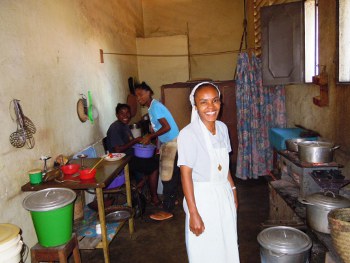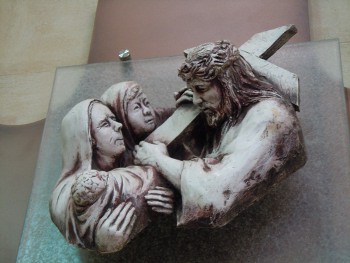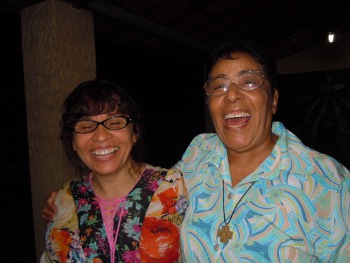Submitted by admin on
 Impelled by love of Christ and concern for a world in need of this message, we give ourselves with all our strength to making the Gospel known so that it may become a source of life for everyone.
Impelled by love of Christ and concern for a world in need of this message, we give ourselves with all our strength to making the Gospel known so that it may become a source of life for everyone.
Participation in this mission demands availability. This implies willingness to be sent wherever the call of God and the needs of our brothers and sisters are most urgent and where the kingdom can be best served by our specific apostolate.
With confidence in the abiding and transforming presence of the Holy Spirit in our world, we participate in the spiritual renewal of the human heart so that peace and justice may reign. This challenges us to search for the roots of injustice and hatred and war, evils which spring from human hearts, and to recognize the manifestations of them. As we allow God's love to transform our own hearts and lives, we become more sensitive to the poor and oppressed upon whom injustice weighs so heavily. Our response must be a willingness to do what we can to alleviate these evils, to engage in the struggle for justice in all ways which are consonant with our vocation.



Living the vows leads to the true freedom of the children of God. The vows are a force against the disordered attractions of pleasure, possessions and power. They focus our lives entirely on Godin faith, helping us to remain attentive to his presence and to surrender to his action. They make us more available to work with Christ for the kingdom. Light and darkness alternate on this path to liberty. Renunciations made for the sake of love involve us in a spiritual combat which recalls to us the Gospel command "Watch and pray" (Matthew 26:41). We rely on the support of the community and, above all, on the unchanging love of the Lord who promised the hundredfold and his joy to those who would leave all to follow him.






Our consecration commits us to putting on the mind of Christ and rejecting those values which are contrary to his Gospel. This witness must be made visible by the way we live the vows. As times change, new implications of the vows emerge with special significance in the contemporary world. Our chastity, poverty and obedience ought to show how it is possible to love ail people, especially the rejected, the lonely and the poor; to hold in common and share rather than monopolize the goods intended by God for all; and to oppose what is oppressive and inimical to human dignity. Thus these vows can be a protest against the abuse of pleasure, wealth and power.
 "God alone is all and takes the place of all."
"God alone is all and takes the place of all."
Mother Therese, Letter to Mother de Larochenegly, October 5, 1864.
Consecrated life can manifest that God "alone is all and takes the place of all". It affirms that charity is the supreme value and that it is possible to live in unselfish love, sharing and service. Such witness proclaims that the kingdom of God, although its fullness is yet to come, is nevertheless already in our midst.
We must question our attitudes and practices of social justice both inside and outside our communities and when necessary revise them. In every aspect of our life we want to be alert to this demand so that we may live in truth the commandment to love one another. In apostolic contacts we try to educate others to a consciousness of and personal commitment to social justice in the spirit of the Gospel.


As we enter more and more into the mystery of Christ's poverty, we shall reflect the freedom and joy of those for whom God is the only treasure. In spite of our limitations, we want to bear witness to the truth that human progress and happiness are found not in money and possessions but in a life of communion and sharing with one another.
